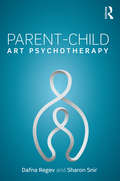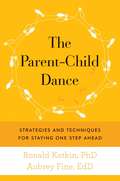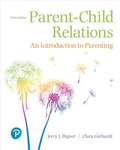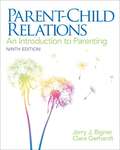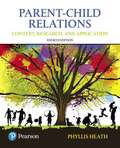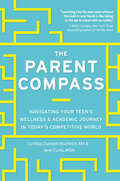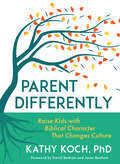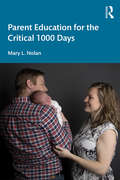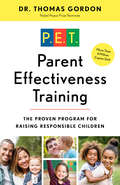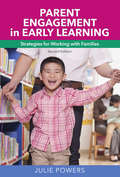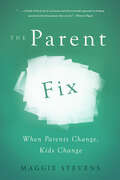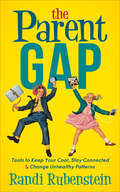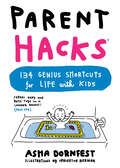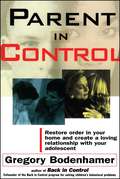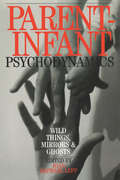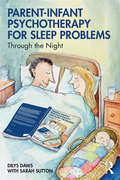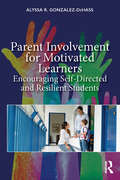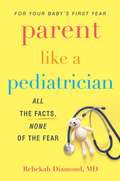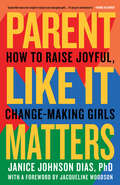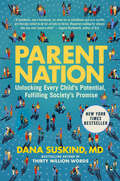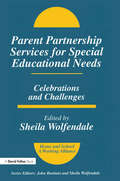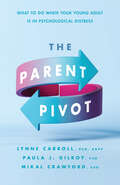- Table View
- List View
Parent-Child Art Psychotherapy
by Dafna Regev Sharon SnirParent-Child Art Psychotherapy presents a working model of ways to incorporate parents into a child’s art therapy sessions, drawing on the relational-psychoanalytic notion of mentalization in the treatment of difficulties within childhood relationships. The model is introduced by clearly explaining the theory, the setting, the role of the therapist, and the work with the parents. In addition, the book offers a full section dedicated to practical applications of the model, replete with illustrative case studies and detailed therapeutic art-based interventions covering leadership, movement, collaborative and solitary work, and parent-child exercises. Intended for art therapists, students, parent-child psychotherapists, and other therapists interested in expanding their knowledge in the field, Regev and Snir provide a definition and conceptualization of a short-term treatment model with the potential to have comprehensive effects leading to positive change.
The Parent-Child Dance: Strategies and Techniques for Staying One Step Ahead
by Aubrey Fine Ronald KotkinA unique manual to raising a child—for parents everywhere—using the metaphor of dance to provide expert, comforting advice. Having children and raising a family should be the greatest joy in one’s life, but it is a role that requires tremendous responsibility and patience. As parents, our job is to provide a strong foundation for our children, so that they can eventually grow up to become self-sufficient adults. However, just like everything in life, all children are different, some requiring more support than others and to varying degrees over time. Parenting is like a dance between parent and child. The more seamless the movements, the more graceful the interaction. When a parent takes the lead or decides to share, over time with practice, the dance can be smooth and effortless. Nevertheless, when the child is unintentionally allowed to take the lead, the parent-child dance may appear more rocky and unstable. This often occurs when the parent is unclear and at odds with their role. The ensuing battle for the lead may cause disharmony in the relationship and the dance. Parenting is a lifelong commitment that takes patience, thoughtfulness, and skill. The Parent-Child Dance is designed to explain the concept of the dance and act as a catalyst for encouraging parents to begin their journey in making positive changes in their child’s life. Parents will recognize the scenarios and gain insight through humorous examples and step-by-step strategies to avoid disharmony.
Parent-child Relations: An Introduction To Parenting
by Jerry Bigner Clara GerhardtA user-friendly resource that examines the intricacies of parent-child relationships in contemporary society For decades, Parent-Child Relations: An Introduction to Parenting has prepared countless teachers and practitioners by using family systems and systemic family development theory as frameworks to explore the evolution of the family, the stages of family system development, and the challenges faced by all types of families. Readers will discover a broad range of issues encountered across the lifespan to help them prepare for their roles as professionals working with families or as parents themselves. <p><p> Filled with relevant new topics, two new chapters, and new cultural snapshots, the 10th Edition has been extensively updated while retaining the essential developmental approach and comprehensive coverage.
Parent-Child Relations: An Introduction to Parenting
by Clara Gerhardt Jerry BignerNow in the Ninth Edition, Jerry Bigner's Parent-Child Relations, the classic resource for child development professionals and parents themselves, has undergone a thorough revision anchored by the vision of the late Dr. Bigner and executed by new co-author, Clara Gerhardt. Maintaining its fundamental structure and unique approach, the text uses family systems and systemic family development theory as a framework to explore how parent-child relations change in tandem with developmental changes occurring with children, adults, and the wider family system. Thoughtful updates and revisions were done to increase the effectiveness and currency of the text. The text continues to provide strong emphasis on various theoretical and practical models pertaining to parenting. For decades now, this classic text has prepared countless teachers and practitioners by its proven and practical approach, utilizing family systems and systemic family development theory to explore how parent-child relations change in tandem with developmental changes occurring with children, adults, and the wider family system. The most comprehensive and current resource available to students as they prepare for working with parents and families, and for their roles as parents themselves, this best-selling resource carries on the essential message of its originator, Dr. Jerry Bigner, and will continue to nurture future family scholars and practitioners for years to come.
Parent-Child Relations: Context, Research, And Application (Fourth Edition)
by Phyllis HeathThis life-span approach to parent-child relations gives students a comprehensive, contemporary look at theories, research, and techniques within historical and cultural contexts. It covers every stage of development, including older parents and their adult children, and uses an inclusive approach that looks at a variety of different family contexts, such as foster families, military families, and families with an LGBTQ member, as well as the influence of culture and ethnicity on family beliefs and behaviors. The first chapter focuses on the history of theoretical and research influences of childrearing to help students understand why parents today hold certain beliefs regarding how to raise children. Theory and research are then interwoven through the book. An early chapter on strategies and techniques also sets the stage for upcoming discussions of parent-child relations. Written with the student in mind, the book presents numerous examples. Critical thinking questions in every chapter encourage students to stop and consider their views regarding the material, and Spotlight features throughout provide examples of the influence of technology, diversity, and poverty on families.
The Parent Compass: Navigating Your Teen's Wellness and Academic Journey in Today's Competitive World
by Cynthia Clumeck Muchnick Jenn Bowie CurtisBragging rights and bumper stickers are some of the social forces fueling today&’s parenting behavior—and, as a result, even well-intentioned parents are behaving badly. Many parents don&’t know how best to support their teens, especially when everyone around them seems to be frantically tutoring, managing, and helicoptering. The Parent Compass provides guidance on what parents&’ roles should be in supporting their teens&’ mental health as they traverse the maze of the adolescent years. For anyone daunted by the unique challenge of parenting well in this pressure-laden and uncertain era, The Parent Compass offers: Advice on fostering grit and resilience in your teen Strategies to help your teen approach life with purposeGuidance on how to preserve your relationship with your teen while navigating a competitive academic environmentClear explanations of your appropriate role in the college admission processEffective ways to approach technology use in your home, and much more! Using The Parent Compass to navigate the adolescent years will help you parent with confidence and intention, allowing you to forge a trusting, positive relationship with your teen.
Parent Differently: Raise Kids with Biblical Character That Changes Culture
by Kathy KochMost parents misguidedly prioritize behavior. The why and how to instill character.Behavior modification does not guarantee good character qualities. Character influences decisions. It&’s evidenced in our speech, actions, and attitudes. It&’s about who we are and what we do. The world competes for the hearts of our kids—and we see its negative impact in their pride, laziness, and entitlement. As Christians, however, we want to see the character of Jesus Christ in our children. Dads and moms, grandparents, and teachers all want to see their children grow in humility, gratitude, and respect—for others and themselves. We want our kids to be brave, compassionate, and joyful. We don&’t want our kids to flounder through life. We want them to flourish and live into their God-given designs and callings. Dr. Kathy Koch helps us to that end by answering essential questions:What is character and why does it matter?Why is there a crisis of character?What are the challenges in developing character?How can we teach or improve character?Not only does character help us accomplish our goals, there are many other benefits of mature character: we will be blessed, stand out for Jesus, attract good friends, grow in wisdom, and live in freedom.Koch provides an invaluable resource for shepherding our children in godly character.
Parent Education for the Critical 1000 Days
by Mary L. NolanAs research in neuroscience increasingly points to the unparalleled influence of the first 1000 days of life from conception to two years of age in determining the baby’s life trajectory, the need for high-quality early parenting education delivered by knowledgeable and dedicated professionals becomes ever more apparent. This book describes the global aims of early parenting education. It identifies the key areas that research suggests are important: building a relationship with the unborn and newborn baby; preparing for labour and birth; supporting parents’ mental health; protecting the couple relationship across the transition to parenthood; and education for special groups such as same-sex couples, women with fear of birth, prisoners, military wives and parents from black and minority ethnic backgrounds. All practitioners providing early parenting programmes – midwives, health visitors, family link workers, children’s centre staff and voluntary sector teachers – will gain new ideas for their practice in this book. Students taking midwifery and early childhood courses will find much to support their studies. Ultimately, the book provides inspiration for all those who are committed to the role of parenting education in reducing social inequalities.
Parent Effectiveness Training: The Proven Program for Raising Responsible Children
by Thomas GordonP.E.T., or Parent Effectiveness Training, began almost forty years ago as the first national parent-training program to teach parents how to communicate more effectively with kids and offer step-by-step advice to resolving family conflicts so everybody wins. This beloved classic is the most studied, highly praised, and proven parenting program in the world -- and it will work for you. Now revised for the first time since its initial publication, this groundbreaking guide will show you: How to avoid being a permissive parent; How to listen so kids will talk to you and talk so kids will listen to you; How to teach your children to "own" their problems and to solve them; How to use the "No-Lose" method to resolve conflicts. Using the timeless methods of P.E.T. will have immediate results: less fighting, fewer tantrums and lies, no need for punishment. Whether you have a toddler striking out for independence or a teenager who has already started rebelling, you'll find P.E.T. a compassionate, effective way to instill responsibility and create a nurturing family environment in which your child will thrive.
Parent Engagement in Early Learning: Strategies for Working with Families
by Julie PowersThis second edition of Parent-Friendly Early Learning brings to life real scenarios that care providers face in today's world. We know parent engagement is important for a child's success, but how do you turn parent-provider relationships into partnerships? Learn how to improve parent-teacher communication, deal with family issues and special complications, and how to work with the modern family. Julie Powers has worked with children, families, educators, and communities for over forty years. She started preschool programs at the Dodge Nature Center in St. Paul, Minnesota, an inclusion-based program for Catalina Foothills School District in Tucson, Arizona, and was a consultant for the Air Force Child Development Centers. She has taught at colleges across the country and is currently an associate professor of early childhood education at University of Hawaii Maui College.
The Parent Fix: When Parents Change . . . Kids Change
by Maggie StevensHave you ever tried to change another person? If you have, you probably know it is next to impossible. Most parenting books teach parents how to change the child. The Parent Fix focuses on the parents, emphasizing a parent's need to change to inspire family improvement. If our greatest joys and sorrows come from family relationships, are we truly happy when we are in control of our loved ones? That deep joy we are searching for comes as we watch those we love learn lessons that change their own lives. To have this change it is the parent who must change. In today's age of troubled youth, broken families, and mixed messages from the media, our families are fighting a tough battle to succeed. With the increase in drug and alcohol addiction, eating disorders, gang violence, and teenage suicide, many of our families are failing. Parents need help. There is power in parenting--correct parenting. Rather than focusing on the kids, as so many other self-help books do,The Parent Fix stresses that when parents change, kids change. Focusing on key principles like correct judgement, taking time, education and more, Stevens provides concrete ways parents can change their own behavior to improve the behavior of their children. As a mother, Maggie spent years researching and found the answers needed to successfully raise five children. With over thirty years of practical experience, Maggie knows the answers that make a difference. When parents change . . . kids change.
The Parent Game (The Fabulous Five #6)
by Betsy HaynesJana Morgan, Melanie Edwards, Beth Barry, Christie Winchell, Katie Shannon ... they're The Fabulous Five. They started out as a club whose secret purpose was to keep up with snobby Taffy Sinclair. Now these five best friends are in the seventh grade--are they ready for the ups and downs of junior high? Jana Morgan and Taffy Sinclair have been worst enemies since Mark Twain Elementary School. Now suddenly Taffy wants to be friends. Jana doesn't know what to think about anything anymore. Her mother's getting married again, and in junior high everything is changing so fast. Jana wants to believe Taffy--especially when Taffy promises to help her keep Laura McCall from being her boyfriend's partner in the Family Living project at school. But can Jana really trust her oldest enemy?
The Parent Gap: Tools to Keep Your Cool, Stay Connected & Change Unhealthy Patterns
by Randi RubensteinBridge the gap between how you thought you&’d parent and how you&’re actually parenting now with the tools and inspiration found in this supportive guide. You swore you were going to raise your kids differently . . . so why are your parents&’ words coming out of your mouth? We all want happiness and success for our children throughout their lives. The worry of screwing up the people you love the most is attached to the thought that your behavior will possibly hinder their future state of being. You want the world for them. The Parent Gap shows how to change the patterns from your own childhood you intended to bury—allowing you to access in the heat of the moment that file in your brain with all those parenting tools you took the time to learn. As you close the parenting gap, you will be able to show up as the level-headed adult you truly want to be in your life and especially with your kids. Your confidence and clarity will shine brightly on the fact that you will be sending them off into the world with a rock solid foundation. Using real life stories and practical depictions, The Parent Gap combines the teachings of Dr. Shefali Tsabary, Brené Brown, and Martha Beck with a real-life, down-in-the-trenches parent perspective to create a fun and insightful read.
Parent Hacks: 134 Genius Shortcuts for Life with Kids
by Asha Dornfest Craighton BermanDrawing from the award-winning website ParentHacks.com, here are 134 ingenious ideas for simplifying life with kids. A parent hack can be as simple as putting the ketchup under the hot dog, minimizing the mess. Or strapping baby into a forward-facing carrier when you need to trim his fingernails—it frees your hands while controlling the squirming. Or stashing a wallet in a disposable diaper at the beach—who would ever poke through what looks like a used Pamper? On every page, discover easy-to-do, boldly illustrated, unconventional solutions, arranged by category from Pregnancy & Postpartum through Sleep, Eating, Bath Time, Travel, and more.
Parent In Control
by Gregory BodenhamerParent in Control is based on a highly successful program that has helped thousands of parents regain control over their out-of-control adolescents - whether they wreak havoc at home, in school, or in the community. Living with willful, aggressive, and seemingly incorrigible adolescent behavior is a nightmare many heartbroken and confused parents were forced to endure - until now. In this straightforward, hard-hitting, yet compassionate book, Gregory Bodenhamer, a nationally renowned expert on childhood behavior problems, shows parents how to combat an arsenal that ranges from blatant verbal challenges to physical violence, without resorting to harsh disciplinary measures, expensive counseling, or hospital-based programs. Bodenhamer, a former juvenile probation officer, draws on over twenty years of experience working with difficult children between the ages of 12 and 17 and their parents to offer techniques that work in as little as a few weeks. He covers a wide range of problems - whether your teen is simply ignoring household rules, or perhaps lying, or stealing - to more harmful problems, such as drug and alcohol abuse or unsafe sexual activities. Using real-life scenarios, complete with actual dialogue, Bodenhamer walks you through potentially explosive situations, points out errors most parents frequently make, and provides tested solutions to averting immediate danger - and preventing it from happening again.
Parent-Infant Psychodynamics: Wild Things, Mirrors and Ghosts
by Joan Raphael-LeffThis text focuses on the interweaving psychic realities and unconscious dynamics between family members in the context of changing patterns of socio-cultural expectations, ethical considerations and biological realities.
Parent-Infant Psychotherapy for Sleep Problems: Through the Night
by Dilys Daws Sarah SuttonSleep problems are among the most common, urgent and undermining troubles parents meet. This book describes Dilys Daws' pioneering method of therapy for sleep problems, honed over 40 years of work with families: brief psychoanalytic therapy with parents and infants together. Offering tried and tested ways of helping parents work things out better with their babies when such problems arise, this new edition of Dilys Daws’ classic work, updated with expert help from Sarah Sutton, frees professionals from the burden of feeling they need to rush to give advice to families, showing instead how to begin the challenging journey of discovering new emotions that every baby brings. It sheds light on the sleep problem in the context of a whole range of aspects of the early world: the regulation of babies’ physiological states; dreams and nightmares; the development of separateness; separation and attachment problems; and connections with feeding and weaning. This much-needed, compassionate and well-informed guide to helping parents and babies with sleep problems draws on twenty-first century development research and rich clinical wisdom to offer ways of understanding sleep problems in each individual family context, with all its particular pressures and possibilities. It will be treasured by new parents struggling with sleeplessness and is enormously valuable for anyone working with parents and their babies.
Parent Involvement for Motivated Learners: Encouraging Self-Directed and Resilient Students
by Alyssa R. Gonzalez-DeHassParent Involvement for Motivated Learners provides pre-service teachers and researchers with guidance on how to foster mindful, healthy school–family partnerships that empower students to become resilient, self-directed learners. Given the intense academic pressures on students to succeed – and on parents and teachers to help them do so – it is important to develop learners who can weather increased standards and demands. Committed to helping teachers reflect on how parent involvement relates to motivational concepts such as the growth mindset, self-regulated learning, and intrinsic motivation to learn, this book is an accessible synthesis of relevant research and theory surrounding student motivation and parent involvement.
Parent Like a Pediatrician: All the Facts, None of the Fear
by Rebekah DiamondRebekah Diamond, M.D., the pediatrician, working mom, and parent advocate trusted by Parents magazine and NBC for her adept advice, expertly guides you through the noise to share her fresh, inclusive, sensible, no-nonsense take on making the right choices when it comes the first 12 months of your child's life.Becoming a new parent in the age of online advice can be a minefield of confusion, worries, and fears amplified by myths, misinformation, and too much information. As an experienced pediatrician, Rebekah Diamond is deeply grounded in a fact-based understanding of child healthcare. As a mother, she also understands that the accepted rules aren't always the solution to the challenges of nurturing a healthy new baby. But neither is the overload of relatable but often dangerously misleading information bombarding parents. So how do you trust yourself to make the best decisions for your child? With authoritative up-to-date research and real-world advice on the myriad obstacles facing moms, dads, and caregivers, Dr. Diamond unpacks the whys behind the facts to empower your best parental instincts. From safe-sleep guidelines, breast feeding, and binky addiction to sensory developmental activities, baby products, and the final—and 100% evidence-based—word on the vaccination debate, Dr. Diamond helps parents cultivate the clarity and sound decisions you need to lessen the anxiety (for parent and baby) around what should be the joyful, connecting early months of life."Parenting can be nerve-racking, even for the parents who feel prepared and "ready." The truth is, no one is completely ready or knows the answers to every potential problem or situation that arises in a child's life…. Parent Like a Pediatrician has the capability to put a pregnant or new mom at ease." —Portland Book Review
Parent Like It Matters: How to Raise Joyful, Change-Making Girls
by Janice Johnson DiasAn accessible blueprint to embolden our daughters to be critical thinkers, fearless doers, and joyful change agents for our future—from the proud mother of teen activist Marley Dias, founder of 1000BLACKGIRLBOOKS.&“A stunning and pathbreaking how-to guide and memoir for every mom, dad, or caregiver who believes in rearing children to be healthy individuals and caring citizens.&”—Khalil Gibran Muhammad, author of The Condemnation of Blackness Renowned sociologist Dr. Janice Johnson Dias has devoted her life to nurturing and training girls to become change-makers—whether through her investment in her daughter Marley&’s humanitarian projects or through her work with the GrassROOTS Community Foundation&’s &“SuperCamp.&” In these unprecedented times, her work has never been more urgent, as parents find themselves asking: How do we teach our children to change the world? Dr. Johnson Dias knows that self-realized girls are created through intentional parenting. And so she asks parents to make deliberate choices—from babyhood through adolescence—that will give their girls the resources and foundation to take hold of their own futures and to create sustainable social change. Unlike other parenting experts, Dr. Johnson Dias doesn&’t urge parents to focus solely on their children. Instead, she tasks them with a personal challenge: to find their own joy. Just as Dr. Johnson Dias brings her own jubilant passion to parenting, mentoring, and teaching, she inspires caregivers to do the same. Using cutting-edge research and Dr. Johnson Dias&’s own experiences, Parent Like It Matters offers information and strategies for making discussions of racism and sexism a daily practice, identifying heroes and mentors, educating yourselves together, and uncovering your girl&’s passions and what issues drive her the most. Parenting is enormous work; it can be as overwhelming as it is fulfilling. Within the pages of Parent Like It Matters, parents will find the invaluable tools they need to raise resilient, optimistic girls who determine for themselves what their world will look like.
Parent Nation: Unlocking Every Child's Potential, Fulfilling Society's Promise
by Dana SuskindWorld-class pediatric surgeon, social scientist, and best-selling author of Thirty Million Words Dr. Dana Suskind returns with a revelatory new look at the neuroscience of early childhood development—and how it can guide us toward a future in which every child has the opportunity to fulfill their potential.Her prescription for this more prosperous and equitable future, as clear as it is powerful, is more robust support for parents during the most critical years of their children&’s development. In her poignant new book, Parent Nation, written with award-winning science writer Lydia Denworth, Dr. Suskind helps parents recognize both their collective identity and their formidable power as custodians of our next generation. Weaving together the latest science on the developing brain with heart-breaking and relatable stories of families from all walks of life, Dr. Suskind shows that the status quo—scores of parents convinced they should be able to shoulder the enormous responsibility of early childhood care and education on their own—is not only unsustainable, but deeply detrimental to the wellbeing of children, families, and society. Anyone looking for a blueprint for how to build a brighter future for our children will find one in Parent Nation. Informed by the science of foundational brain development as well as history, political science, and the lived experiences of families around the country, this book clearly outlines how society can and should help families meet the developmental needs of their children. Only then can we ensure that all children are able to enjoy the promise of their potential.
A Parent-Partner Status for American Family Law
by Weiner, Merle H. and Knight, Philip H. Merle H. Weiner Philip H. KnightDespite the fact that becoming a parent is a pivotal event, the birth or adoption of a child has little significance for parents' legal relationship to each other. Instead, the law relies upon marriage, domestic partnerships, and contracts to set the parameters of parents' legal relationship. With over forty percent of American children born to unwed mothers and consistently high rates of divorce, this book argues that the law's current approach to regulating parental relationships is outdated. A new legal and social structure is needed to guide parents so they act as supportive partners and to deter uncommitted couples from having children. This book is the first of its kind to propose a new 'parent-partner' status within family law. Included are a detailed discussion of the benefits of the status as well as specific recommendations for legal obligations.
Parent Partnership Services for Special Educational Needs: Celebrations and Challenges
by Sheila WolfendaleThis book gives a clear understanding of the growth and operation of special educational needs Parent Partnership Services (PPSs). The reader will find an explanation of the broader national and legal context of PPSs, followed by contributions written by Parent Partnership Coordinators and parent workers in various regions. They describe what they actually do, including their work with and support for parents and carers of children with special educational needs. The book includes information on the latest special needs and disability rights legislation; descriptions of innovative good practice in setting up and operating PPSs; case studies from practitioners; advice on how to liaise effectively with other professionals and agencies; guidance on giving and receiving training, especially for independent parental supporters (IPSs); and ways of implementing disagreement resolution schemes. Parent Partnership Coordinators will find this book particularly useful. Special Educational Needs Coordinators, SENCOs, educational psychologists, IPSs and parents will also find it a relevant and timely publication.
The Parent Pivot: What to Do When Your Young Adult Is in Psychological Distress
by Lynne Carroll Paula Jean Gilroy Mikal CrawfordThis book provides information, guidance, and above all hope for parents struggling to support their young adult children in psychological distress. The period of emerging adulthood (ages 18 to 29) is a psychologically vulnerable time. Many emerging adults are anxious, depressed, or otherwise distressed and may turn to unhealthy coping strategies, including substance misuse, unhealthy eating, Internet misuse, and risky and impulsive behaviors such as sexual acting out and reckless driving. Where parents previously functioned in the caretaker role for their young children, they must now "pivot" to a new role: coach, wise counsel, or compeer. Parents may also need to pivot back to a caretaking role for a time if their young adults are dealing with more serious mental health issues. This book provides essential information and practical advice to help parents navigate these difficult challenges and deal with their own distress as they assist their struggling emerging adults. The authors describe various mental health symptoms and disorders common to this age group. They also discuss the difference between normal and more problematic behaviors, and options for professional help and treatment approaches. Not all young adults are willing to receive help, whether from family, friends, or professionals. But regardless of their situation, this book offers tips and strategies for how parents can maintain a loving, empathic relationship with their young adult, even in the most challenging circumstances. Written by psychologists with extensive experience helping emerging adults and their families, this book provides invaluable guidance for communicating effectively, setting boundaries, managing collateral damage within the family, practicing self-care, mourning losses, and developing and practicing compassion for yourself and your young adult. It reflects the complex emotional dynamics occurring both within and between young adults and their parents, and it provides hope for struggling families.
The Parent Pivot: What to Do When Your Young Adult Is in Psychological Distress
by Lynne Carroll Paula Jean Gilroy Mikal CrawfordThis book provides information, guidance, and above all hope for parents struggling to support their young adult children in psychological distress. The period of emerging adulthood (ages 18 to 29) is a psychologically vulnerable time. Many emerging adults are anxious, depressed, or otherwise distressed and may turn to unhealthy coping strategies, including substance misuse, unhealthy eating, Internet misuse, and risky and impulsive behaviors such as sexual acting out and reckless driving. Where parents previously functioned in the caretaker role for their young children, they must now "pivot" to a new role: coach, wise counsel, or compeer. Parents may also need to pivot back to a caretaking role for a time if their young adults are dealing with more serious mental health issues. This book provides essential information and practical advice to help parents navigate these difficult challenges and deal with their own distress as they assist their struggling emerging adults. The authors describe various mental health symptoms and disorders common to this age group. They also discuss the difference between normal and more problematic behaviors, and options for professional help and treatment approaches. Not all young adults are willing to receive help, whether from family, friends, or professionals. But regardless of their situation, this book offers tips and strategies for how parents can maintain a loving, empathic relationship with their young adult, even in the most challenging circumstances. Written by psychologists with extensive experience helping emerging adults and their families, this book provides invaluable guidance for communicating effectively, setting boundaries, managing collateral damage within the family, practicing self-care, mourning losses, and developing and practicing compassion for yourself and your young adult. It reflects the complex emotional dynamics occurring both within and between young adults and their parents, and it provides hope for struggling families.
